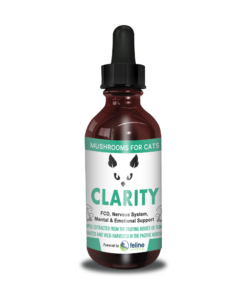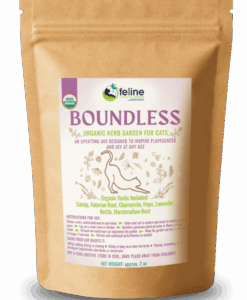The dangers of glyphosate contamination are widely known – but how does it affect our cats? How would a cat be exposed to this unsafe herbicide?
Most widely known as Roundup, glyphosate is the most common products used to contain weeds and grass. Homeowners, farmers and community associations use this product to keep things looking nice outside. If you’ve seen this product being used, you likely have seen people in masks, gloves and even hazmat suits when spraying outside. This is because ingesting or inhaling glyphosate is linked to serious illnesses like cancer.
Many people think that the fear of glyphosate is a big conspiracy theory, but those who have witnessed the harmful effects of this toxin know better. One of our customers lost her cat to glyphosate exposure when her neighbors used Roundup in their yard to kill the weeds. The toxin ran into their shared creek and poor Jazzy (the cat) drank her morning water. Within 24 hours her kidneys failed and she was gone.
So, yeah… glyphosate contamination isn’t a conspiracy to us.
How else might a cat be exposed to glyphosate contamination?
Glyphosate sprayed on the ground stays and spreads in the soil for at least 6 months. This makes it ideal for a weed killer, but horrible for anything that comes in contact with said soil. Cats that roam outside are likely exposed to this toxin regularly from walking on the ground and grooming themselves.
But here’s the real kicker… because the majority of commercial pet foods contain GMO plant ingredients, we’re often feeding our cats glyphosate.
A study was conducted by Cornell University of 18 different popular pet food brands and 100% of them contained glyphosate. Among these foods were Purina, Rachael Ray Nutrish and Natural Balance, “all with over 350 parts per billion (PPB) of glyphosate.” These are touted as more healthy brands of cat food.
And we wonder why 1 in 3 cats are getting cancer now?
While it’s impossible for us or our cats to avoid exposure to glyphosate all together, there are things we can do to lessen the exposure and risk.
- Feed a fresh food diet. The research showed that there was little to NO trace of glyphosate in fresh, raw diets for cats. Because cats have no requirement for plant matter, it’s not needed anyway. We add organic vegetable matter back into our cats’ diet for the health benefits without the risk.
- Don’t use Roundup in your yard! there are so many natural ways to kill weeds and grass. Sure, they may not last six months, but your pets and the neighborhood pets will last much longer.
- Only allow your cats outside under your supervision. It’s great for cats to touch the earth, but only you can keep them on the earth that’s safe.




Recent Comments